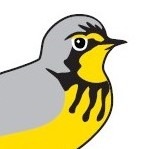But there is good news too. Actions matter. When information from programs like Project FeederWatch and other Citizen Science initiatives are used to make decisions, we can improve the story for birds.

Evening Grosbeaks Photo: Gord Belyea
23 October 2019 (Port Rowan, ON) – Joining Project FeederWatch and keeping track of the birds in your backyard helps birds!
You don’t have to be an expert birder to take part in Project FeederWatch, and it only takes 15 minutes every few weeks from 9 November to 3 April. Having more people participate provides a clearer picture of both bird and environmental health. People of all ages and experience can count the birds that visit their feeders in winter to help Birds Canada and Cornell Lab of Ornithology understand how our backyard birds are doing.
FeederWatch celebrated 33 years of Citizen Scientists helping to improve our understanding of backyard birds across Canada. That means we now have over three decades of comparative results. The findings provide important insights. Kerrie Wilcox, Birds Canada, Canadian Leader for Project FeederWatch said: “Over its long lifetime, the survey has shown the increasing good fortunes of birds such as Cooper’s Hawks. This was also reflected in the recent State of Canada’s Birds 2019 report that showed birds of prey such as Cooper’s Hawks have benefitted from action taken to improve their outcome.”
Birds of prey populations in Canada have increased 110% since the 1970s largely because the pesticide DDT was banned. Cooper’s Hawks have gravitated to backyards possibly because they have learned that bird feeders create large groupings of prey.
Another species that has seen positive results is the Northern Cardinal. They have expanded their range since 1989, as demonstrated by the growing percentage of FeederWatchers reporting cardinals, especially in southeastern Canada. Cardinals have benefitted from two growing trends – more people with bird feeders, and more people landscaping their yards with shrubs and fruit bearing trees.
On the other hand, FeederWatch has identified some species of concern, including an alarming decline in Evening Grosbeaks. Evening Grosbeaks have experienced a range contraction and population decrease in North America. Loss of nesting habitat and food sources may be affecting Evening Grosbeaks but it is still difficult to say for sure what is causing the decline.
“To have thousands of people spend 15 minutes every few weeks looking at their feeders not only helps us answer questions and create a picture of how our resident winter feeder birds are doing, but it’s also a lot of fun!” says Wilcox. Anyone can join Project FeederWatch in Canada by making a donation of any amount to Birds
Canada. Visit birdscanada.org/feederwatch, call 1-888-448-2473, or email pfw@birdscanada.org. In the United States, call 1-866-989-2473. The 2019-20 Project FeederWatch season runs from 9 November 2019 to 4 April 2020.
FeederWatchers in Canada will receive a poster of common feeder birds, a calendar, last season’s results, and access to online data tools. Those making a minimum donation of $50 can also choose to receive the quarterly magazine BirdWatch Canada, produced by Birds Canada.

About Birds Canada
Bird Studies Canada recently changed its operating name to Birds Canada to better reflect the extent of our work beyond the study of birds, encompassing public engagement, habitat stewardship, education and training, involvement in guiding conservation decisions, and more. Birds Canada (birdscanada.org) is Canada’s leading national charitable organization dedicated to bird science and conservation. Birds Canada operates scientific programs in all 13 Canadian provinces and territories as well as international research programs. The work of 79 Birds Canada staff is supported by nearly 60,000 Citizen Science volunteers.
About Project FeederWatch
Project FeederWatch is a joint research and education project of Birds Canada and the Cornell Lab of Ornithology. Armstrong Bird Food and Wild Birds Unlimited are national sponsors of Project FeederWatch in Canada. The conversation continues year-round on Facebook.com/groups/FeederWatchCanada/
Media Contact
Kerrie Wilcox,
Canadian Leader, Project FeederWatch, Birds Canada
Tel. 519-586-3531 ext. 134 or 1-888-448-2473 (Toll-free)
kwilcox@birdscanada.org
birdscanada.org
In the U.S., contact Emma Greig, 607-254-2148, eig9@cornell.edu.

